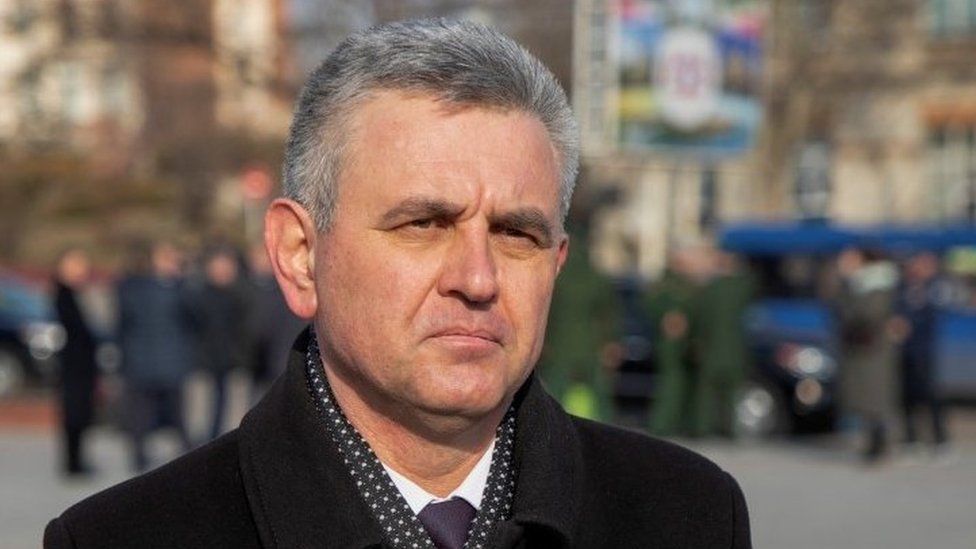Transnistria: Ukraine denies attempt on Moldova separatist leader
- Published

Security services in Moldova's breakaway Transnistria region claim they have thwarted a plot by Ukraine against the entity's leadership.
They said two people had been charged with terror, espionage and treason after conspiring to murder officials, including leader Vadim Krasnoselsky.
Ukraine's SBU security service said the claims were a provocation by Moscow.
Transnistria is a small sliver of land sandwiched between Moldova and Ukraine which is dependent on Russia.
Since 1992 it has hosted a contingent of around 1,700 Russian peacekeepers. Moscow has warned that any threat to the entity's security would be an attack on Russia itself.
Moldova itself has a pro-Western government but fears Russia is plotting a coup, and last month Ukrainian officials accused Russia of "psy-ops" after Moscow accused it of plotting an invasion of Transnistria.
Authorities in the Transnistrian capital Tiraspol quoted by the Reuters news agency said that the suspects were operating "under the direct control and instructions of representatives of the security service of Ukraine (SBU) to carry out the murder of officials".
They said the pair most likely intended to detonate a Land Rover full of explosives in central Tiraspol to cause maximum casualties, and that they were targeting officials and their families.
The SBU denied that there was any planned attack.
"Any statements by representatives... of the fake 'People's Republic of Transnistria' regarding the participation of the SBU in the preparation of a terrorist attack should be considered exclusively as a provocation orchestrated by the Kremlin," the agency said in a statement.
Moldovan officials said they were investigating any claims and were ready to respond to any security threats.
With a population of just 2.6 million, Moldova is one of Europe's poorest economies and has been heavily exposed to the war in Ukraine.
Last June it was awarded EU candidate status on the same day as Ukraine, bringing it one step closer to joining the bloc.
But it has faced a major energy crisis because of its outdated power infrastructure and problems with gas supplies from Russia.
Rampant inflation and a big influx of refugees from Ukraine have created further pressures, leading to protests organised by pro-Russian groups.
The country's pro-EU President Maia Sandu has accused Russia of plotting to bring down Moldova's leadership with the aid of foreign saboteurs from Russia, Serbia, Belarus and Montenegro.
The Kremlin has accused Moldova's leaders of slipping into anti-Russian hysteria and warned them to be "very, very careful" with their statements.
Dominated by Russian speakers, Transnistria proclaimed independence from Moldova in 1990 as the Soviet Union fell apart. A short border war led to a ceasefire in 1992 and that has been enforced ever since by the Russian troops stationed there.
As long as Transnistria's future remains unclear, tensions will remain. Moldova's new prime minister has made demilitarising the area as a priority and the foreign ministry has said it will continue to seek a peaceful solution.
But Russian President Vladimir Putin has pointedly revoked a 2012 decree committing Russia to finding a solution for Transnistria based on respect for Moldova's sovereignty and territorial integrity.
Related Topics
- Published5 March 2023
- Published24 February 2023
- Published23 June 2022
- Published27 April 2022
- Published20 February 2023
- Published29 November 2022